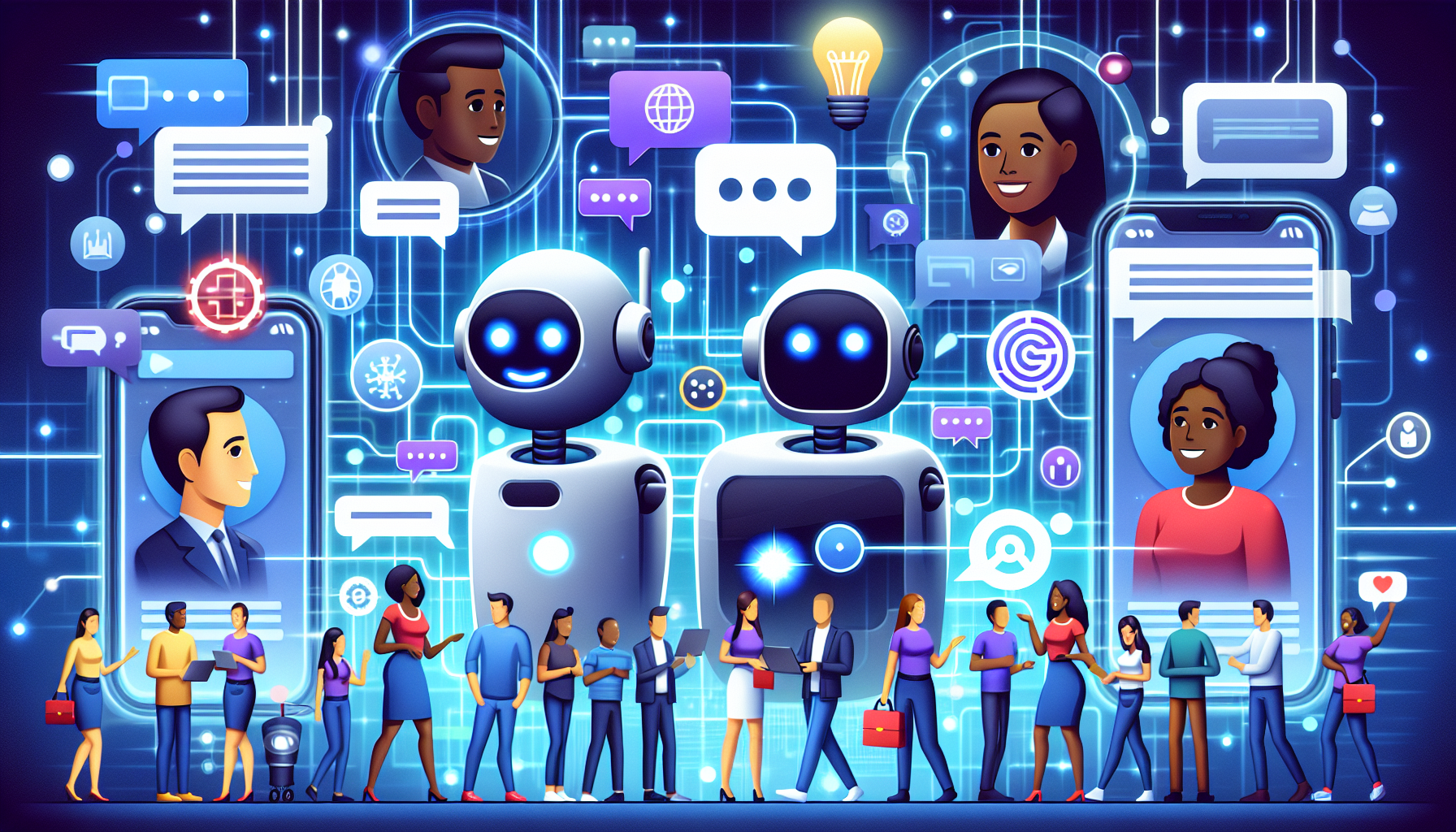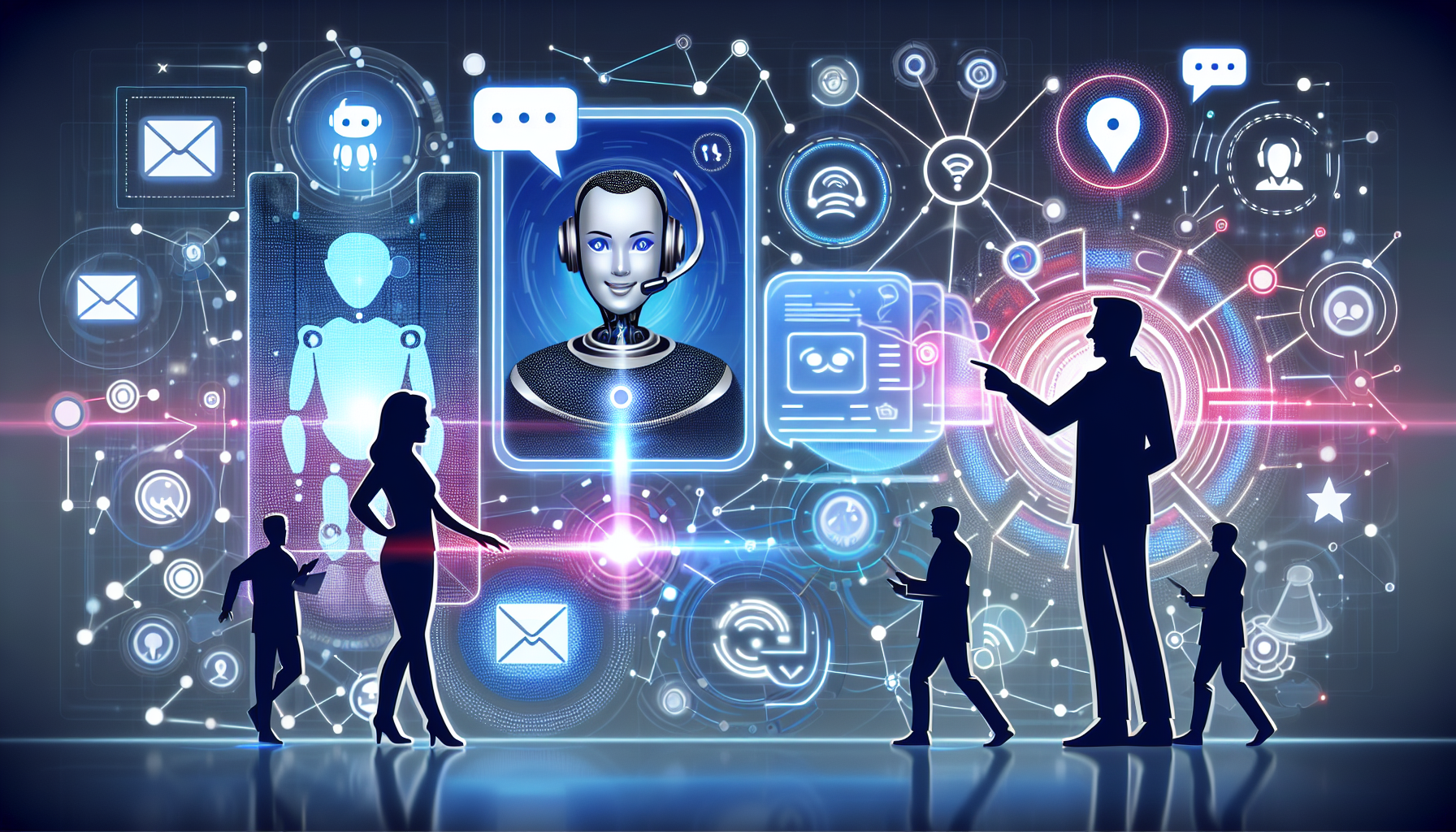Curious about how AI elevates customer service beyond traditional methods? Customer support software plays a crucial role in this transformation. AI powered customer service not only answers your clients 24/7 but also provides uniquely tailored support, all while optimizing your team’s workflow. This article outlines the mechanics of AI in service roles, its advantages in efficiency and personalization, and real-world applications that demonstrate AI’s transformative capabilities. Expect insights without the full story revealed, preparing you to harness AI effectively in your customer service strategy.
Key Takeaways
-
AI is transforming customer service by providing 24/7 automated support, personalizing service with rich customer data, and producing actionable insights for continuous improvement.
-
Conversational AI agents, such as chatbots and virtual assistants, significantly increase the efficiency of customer interactions by automating routine tasks and providing complex inquiry support through NLP and machine learning. Customer support software plays a crucial role in this transformation by integrating these AI capabilities.
-
AI-powered customer service tools enhance agent productivity by automating tasks, optimizing operations, and offering intelligent routing and predictive analytics for proactive service.
What is AI in Customer Service?
AI in customer service refers to the integration of artificial intelligence technologies to enhance, assist, or automate customer support processes. By leveraging natural language processing (NLP), machine learning (ML), and generative AI, businesses can handle tasks that traditionally required human intervention. This not only improves the overall customer experience but also lightens the workload for customer service agents.
AI customer service solutions can interpret and respond to customer inquiries with remarkable accuracy, thanks to advancements in NLP. These systems can understand the context and nuances of customer interactions, providing relevant and timely responses. Whether it’s answering frequently asked questions, offering product recommendations, or resolving issues, AI-powered tools ensure that customers receive consistent and efficient support around the clock.
Exploring AI in Customer Service

Gone are the days when customer satisfaction hinged solely on human interactions. AI in customer service is revolutionizing the field by enhancing customer interactions, ensuring issues are resolved with unrivaled efficiency. By automating routine customer service tasks, AI enables service teams to focus on more complex inquiries, fostering a more productive environment that benefits both the customer and the agents. Customer support software plays a crucial role in this transformation, providing the necessary tools to implement AI-powered customer service. The power of AI doesn’t stop at automation; it extends to:
-
Providing a 24/7 support system that tirelessly addresses customer inquiries
-
Offering personalized service based on rich customer data
-
Generating actionable insights that continuously refine the customer experience.
As AI technology evolves, so does its ability to understand and process natural language, making each customer interaction more intuitive and human-like. The integration of natural language processing (NLP) and machine learning capabilities means that AI customer service agents can now interpret the nuances of customer behavior, tailor their responses accordingly, and even anticipate future needs. This level of personalized service was once the domain of human agents alone, but AI is closing the gap, ensuring that the quality of customer service experiences remains high, irrespective of the hour or the volume of customer calls.
The Rise of Conversational AI Agents

Conversational AI agents, including sophisticated chatbots and virtual assistants, are spearheading a new era in customer service. Their rise is characterized by:
-
An ability to automate routine tasks
-
Adeptly assist with more complex customer inquiries
-
Implementation of natural language processing and machine learning
-
Engaging in natural-sounding dialogues
-
Providing timely and relevant solutions to customer questions
These AI agents are often integrated into customer support software, enhancing the overall efficiency and effectiveness of customer service operations.
The efficiency of customer interactions has soared, with up to 50% of customer support queries being resolved instantly and accurately, thanks to these innovative customer support agents utilizing conversational AI.
Chatbots at the Frontline
Front and center in the digital customer service arena are AI-powered chatbots. These tireless digital assistants are designed to handle a barrage of customer queries, from balance inquiries to product recommendations, and can engage in multiple conversations at once without missing a beat. Their ability to operate round-the-clock means that customer support is never offline, ensuring continuous accessibility and responsiveness to customer needs. Chatbots are also becoming increasingly sophisticated, with generative AI enabling them to handle routine support questions and learn from each interaction, which improves their ability to deliver relevant and helpful responses.
In addition to chatbots, customer support software plays a crucial role in AI-powered customer service, providing the tools necessary to manage and streamline customer interactions.
The true power of chatbots lies in their adaptability and learning capabilities. Unsupervised AI chatbots, for instance, refine their responses with each customer interaction, enhancing their accuracy and consistency over time. They serve as the first line of defense, efficiently fielding common queries and seamlessly transitioning the customer to a live agent when the issue requires a human touch. By filtering out straightforward questions, chatbots allow human agents to focus on complex customer needs, ultimately contributing to a more robust and effective customer service experience.
Virtual Assistants for Personalized Support
AI-powered virtual assistants bring a new level of personalization to customer service. They leverage sentiment analysis and natural language processing to:
-
Comprehend product inquiries
-
Contextualize interactions to deliver efficient and personalized support
-
Analyze rich streams of customer data
-
Offer self-service options tailored to the individual user
Incorporating customer support software, these virtual assistants utilize advanced tools to enhance service delivery.
This enhances the customer experience by making it feel unique and catered to their specific needs.
The effectiveness of virtual assistants in providing personalized support is also a testament to the proactive approach they enable for support teams. AI’s predictive capabilities empower teams to identify common user issues and address them before they escalate, which not only streamlines the customer journey but also fosters a deeper connection between the customer and the brand.
Voice-Enabled AI for Phone Support
Voice-enabled AI technologies are transforming phone support by providing customers with an intuitive and accessible way to resolve their queries. Virtual assistants like Amazon Alexa, Apple’s Siri, and Google Assistant facilitate voice-based interactions, making it easier for customers to find the help they need without navigating through complex menus or waiting in long phone queues. Moreover, these AI systems offer support in various native languages, thereby extending global reach and inclusivity.
Customer support software plays a crucial role in integrating these AI technologies to streamline customer service operations.
The convenience of voice-enabled AI assistance is further enhanced by its availability at any time, ensuring that customers receive support precisely when it’s needed.
Enhancing Agent Productivity with AI Tools

AI is not just revolutionizing customer interactions; it’s also turbocharging agent productivity. By automating routine tasks and optimizing operations, AI tools free up agents to concentrate on more complex and meaningful customer engagements. These tools provide agents with smart language processing, data synthesis for recommendation actions, and enhance customer engagement through proactive support.
Customer support software plays a crucial role in this transformation, offering a suite of tools designed to streamline and enhance customer service operations.
Additionally, AI-powered quality management systems offer:
-
Real-time performance insights
-
Agile and responsive support service
-
Constant evolution to meet customer needs
-
Uplift in agent productivity
-
Marked improvement in the quality of customer service experiences.
Intelligent Routing to the Right Agent
Intelligent routing, a shining example of AI’s prowess, ensures that customer inquiries are directed to the most suitable customer service agent for the job. By analyzing customer intent and automating the categorization of incoming requests, these AI systems ensure that tickets are swiftly routed to the optimal support agent. This not only improves efficiency but also significantly enhances customer satisfaction, as customers are quickly connected to an agent who has the expertise to resolve their issue with precision.
Customer support software plays a crucial role in this process, providing the necessary tools for AI-powered customer service.
The intelligence of AI-driven routing systems includes:
-
Assessing agent utilization
-
Giving customers a clear picture of their position in line and their expected wait time
-
Integration with customer databases
-
Employing detailed question paths
These features further refine the matching process, ensuring each customer interaction is as efficient as it is effective.
Predictive Analytics for Proactive Service
Predictive analytics stands at the forefront of proactive customer service. By harnessing machine learning algorithms to analyze customer behaviors and purchasing activities, AI provides service agents with the foresight to anticipate future customer actions. This allows for the delivery of timely and relevant responses that not only address the customer’s current needs but also preemptively resolve potential issues, thereby enhancing the overall customer service experience.
Customer support software plays a crucial role in this process by providing the necessary tools for AI-powered customer service.
The power of predictive analytics in proactively shaping the customer journey is undeniable. It enables businesses to:
-
Tailor their services and communications to meet the unique preferences and needs of each customer
-
Elevate the standard of personalized service
-
Increase sales
-
Heighten customer loyalty.
Knowledge Base Optimization
The optimization of knowledge bases is yet another area where AI is making significant strides. By ensuring that knowledge bases are consistent and up-to-date, AI tools help deliver a seamless customer service experience. AI-powered systems can generate drafts of knowledge base articles using information gleaned from customer conversations and CRM data, ensuring that the collective wisdom of the organization is preserved and shared.
Customer support software plays a crucial role in this process, providing the necessary tools to manage and optimize AI-driven customer service.
These systems also transform internal product documentation into customer-friendly articles, keeping information accurate and current, which is crucial for resolving complex customer queries.
Leveraging AI for Customer Data Analysis
AI’s ability to analyze vast amounts of customer data is transforming how businesses understand and interact with their customers. By leveraging AI for customer data analysis, support teams can gain deep insights into customer behavior, preferences, and pain points. This information is invaluable for improving customer satisfaction and personalizing customer experiences.
AI tools can sift through customer interactions, purchase histories, and feedback to identify trends and patterns. These insights enable businesses to tailor their services to meet the unique needs of each customer, enhancing the overall customer experience. Additionally, AI-driven data analysis helps identify areas for improvement in customer service, allowing support teams to proactively address issues before they escalate.
The Impact of AI on Customer Engagement

AI’s influence on customer engagement is profound, with personalized strategies and real-time data integration playing a pivotal role in increasing conversion rates and fostering customer loyalty. By utilizing predictive analytics, businesses are empowered to tailor their services to match customer preferences, stay ahead of upcoming trends, and address common issues before they arise.
Customer support software is a key tool in AI-powered customer service, enabling businesses to efficiently manage and resolve customer inquiries.
The result is a dynamic and engaging customer service environment that resonates with customers and encourages them to return time and again.
Sentiment Analysis for Understanding Emotions
Sentiment analysis and natural language processing are key components that enable AI tools to delve into the emotional landscape of customer interactions. By recognizing and processing human emotions, these tools can deliver responses that are not just accurate but also empathetic, enhancing the quality of customer conversations.
Customer support software often incorporates these AI capabilities to improve the efficiency and effectiveness of customer service.
This nuanced understanding of emotions allows AI to provide personalized responses that resonate with customers, leading to a more satisfying and memorable customer service experience.
Personalization Through Purchase History
AI takes personalization to the next level by leveraging purchase history and customer behavior patterns to deliver experiences that are truly tailored to the individual. By creating detailed customer profiles from interactions across various touchpoints, AI can anticipate needs and preferences, allowing businesses to provide service that feels both thoughtful and intuitive. Some benefits of AI-powered personalization include:
-
Increased customer satisfaction and loyalty
-
Higher conversion rates and sales
-
Improved customer engagement and retention
-
Enhanced customer experience and brand perception
To achieve this, many businesses utilize customer support software, which integrates AI to streamline and enhance customer service operations.
With AI, businesses can unlock the power of personalization and create meaningful connections with their customers.
The predictive capabilities of AI are particularly powerful when it comes to product and service recommendations. By analyzing extensive user data, AI can accurately predict future customer behaviors and make recommendations that are relevant and likely to be well received. This not only enhances the customer experience but also fosters a deeper connection between the customer and the brand, laying the foundation for long-term customer relationships.
Real-Time Data for Immediate Insights
The ability of AI to analyze large volumes of real-time data is a game-changer for customer service. By extracting actionable insights and detecting patterns in customer behavior, AI-powered systems can:
-
Recommend solutions that are relevant and timely
-
Provide instant analysis and response
-
Elevate the customer experience
-
Ensure that each interaction feels unique and is informed by the most current and pertinent data available.
Customer support software plays a crucial role in this process, enabling businesses to leverage AI for enhanced service delivery.
This level of immediacy and personalization not only improves customer satisfaction but also encourages a willingness to pay for personalized services, thereby benefiting the business’s bottom line.
Generative AI for Customer Service
Generative AI represents a significant advancement in customer service technology. This type of AI can generate human-like responses to customer queries, making interactions more natural and engaging. Generative AI for customer service can be used to create sophisticated chatbots capable of handling a wide range of customer inquiries, from simple questions to complex issues.
By analyzing customer data, generative AI can provide personalized recommendations and solutions, enhancing the customer experience. These AI systems continuously learn and improve from each interaction, ensuring that responses become more accurate and relevant over time. Support teams can also benefit from the insights generated by AI, using them to refine their strategies and deliver better service.
AI and Self-Service: Empowering Customers

Self-service options are a key aspect of modern customer service, and AI is at the forefront of this empowerment. By providing instant access to information and enabling customers to resolve their own issues with ease, AI-powered chatbots and visual IVR systems are revolutionizing the way in which support is delivered. Customer support software plays a crucial role in integrating these AI tools to streamline customer interactions. This shift towards self-reliance not only enhances the customer experience but also reduces the workload on customer service teams, allowing them to focus on more complex tasks.
Chatbots as Self-Service Guides
Chatbots excel as self-service guides, leading customers through decision trees and offering timely assistance at every step. The design of a chatbot’s user interface plays a critical role in its effectiveness; an engaging and intuitive interface encourages customers to navigate the self-service process with confidence. Moreover, a well-designed chatbot can manage multiple inquiries simultaneously, ensuring that each customer receives the attention they need without delay.
Customer support software, including AI-driven chatbots, has become an indispensable tool for customers seeking quick and efficient solutions. They are programmed to:
-
suggest actions based on browsing activities
-
predict potential friction points
-
offer assistance proactively, often before the customer even realizes they need help
This proactive approach to self-service not only streamlines the customer journey but also enhances the overall customer service experience, ultimately helping to improve customer service.
Visual IVR for Streamlined Navigation
Visual IVR systems, when integrated with AI, provide a seamless and user-friendly experience for customers seeking support. These systems offer a visual menu that customers can navigate with ease, allowing them to find the right assistance without encountering the frustration of traditional IVR systems.
Customer support software plays a crucial role in enhancing these AI-powered visual IVR systems, ensuring efficient and effective customer service.
The visual aspect of these systems is further enhanced by AI technology, which can guide customers through complex procedures, such as product setup or troubleshooting, in real-time.
DIY Troubleshooting with AI Assistance
AI’s contribution to DIY troubleshooting is transforming the customer experience by providing clear, guided assistance for resolving issues independently. Conversational AI engages in dialogue with customers, meticulously gathering details to diagnose and suggest the most effective resolution steps. Furthermore, AI help desks streamline the support process, summarizing conversations, suggesting saved replies, and converting internal documentation into customer-facing articles, which ensures that the troubleshooting guidance provided is not only relevant but of superior quality.
Customer support software plays a crucial role in this transformation by integrating AI tools to enhance the efficiency and effectiveness of customer service.
This hands-on approach empowers customers, instilling confidence in their ability to handle issues while saving time for both the customer and the customer support teams, including support agents.
Implementing AI Customer Support Software
The implementation of AI customer support software is a strategic process that requires careful consideration of a company’s unique customer service needs. This process involves evaluating the efficiency and effectiveness of the support team, streamlining customer support experiences, and managing a large volume of queries with ease.
To make the most of AI technology, it’s essential to:
-
Communicate the capabilities and limits of the AI solution
-
Incorporate regular review and training using feedback loops
-
Ensure that strategies such as gradual deployment are in place
When done correctly, implementing AI can support business growth by scaling operations without a proportional increase in costs.
Evaluating Your Customer Service Needs
Before diving into the world of AI, companies must take a step back to evaluate their customer service landscape. Identifying the specific challenges faced by customer service teams is critical to finding the right AI solution. Clear goals need to be established for integrating AI into customer support to ensure alignment with business objectives and to measure success through specific metrics.
Introducing customer support software can help streamline this process by providing tools that enhance the efficiency and effectiveness of AI-powered customer service.
This evaluation phase is crucial to not only understanding where AI can best be applied but also to setting the stage for a seamless integration that elevates the customer experience.
Selecting the Right AI Customer Support Platform
Selecting the right AI customer support platform is a pivotal decision that can shape the trajectory of customer service for a business. It’s imperative to choose a platform whose features resonate with the company’s customer support philosophy and that can integrate smoothly with existing systems.
Customer support software plays a crucial role in AI-powered customer service by providing the necessary tools and features to enhance customer interactions.
Some key factors to consider when choosing a platform for your business are:
-
Flexibility and customization options
-
User-friendly interface
-
Integration with other tools and systems
-
Scalability to accommodate business growth
-
Cost-effectiveness and value for money
By evaluating these factors, you can select a platform that aligns with your business needs and supports your growth objectives.
Integrating AI into Existing Customer Service Processes
Integrating AI into existing customer service processes is a delicate endeavor that requires meticulous planning and training. Starting with specific, manageable tasks can help staff adapt to the new technology and facilitate a smoother transition. Introducing customer support software can further streamline these processes by providing the necessary tools for AI-powered customer service. Thorough training on how to leverage AI tools is essential for agents to enhance their capabilities and ensure a seamless customer service experience.
Performance monitoring post-implementation is also crucial to ascertain the effectiveness of AI in supporting customer service and to identify any areas for improvement. Active feedback from both users and customer service staff is invaluable for ongoing refinement of the AI-powered processes, ensuring that the technology continues to meet and exceed customer expectations.
Best Practices for AI-Powered Customer Service
To maximize the benefits of AI-powered customer service, businesses should adhere to several best practices:
-
Assess Needs and Goals: Before selecting an AI tool, it’s crucial to understand the specific needs and goals of your customer service operations. This ensures that the chosen solution aligns with your business objectives.
-
Choose the Right Platform: Select an AI platform that offers the features and flexibility required to meet your customer service needs. Consider factors such as integration capabilities, scalability, and user-friendliness.
-
Integrate Seamlessly: Ensure that the AI tool integrates smoothly with your existing processes. This may involve customizing the tool to fit your workflows and training your team on its use.
-
Train Your Team: Provide comprehensive training to your customer service agents on how to effectively use the AI tool. This will help them leverage the technology to enhance their performance and deliver better service.
-
Monitor and Improve: Continuously monitor the performance of the AI tool and gather feedback from both customers and agents. Use this information to make necessary adjustments and improvements.
By following these best practices, businesses can ensure that their AI-powered customer service is efficient, effective, and delivers a superior customer experience.
Challenges and Risks of AI in Customer Service
While AI offers numerous benefits for customer service, it’s important to be aware of the challenges and risks associated with its implementation:
-
Initial Setup and Training: Implementing AI requires a significant investment in setup and training. Ensuring that the AI system is properly configured and that support agents are adequately trained can be time-consuming and costly.
-
Resistance to Change: Both customers and support agents may resist the transition to AI-powered systems. It’s essential to manage this change effectively by communicating the benefits and providing support during the transition.
-
Potential for Errors: AI systems are not infallible and can make mistakes or provide inaccurate information. Ongoing monitoring and maintenance are necessary to ensure that the AI is functioning correctly and delivering accurate responses.
-
Ongoing Maintenance: AI systems require regular updates and maintenance to remain effective. This includes refining algorithms, updating data sets, and addressing any issues that arise.
-
Risk of Replacing Human Agents: There is a concern that AI could replace human support agents, leading to job losses. However, AI should be viewed as a tool to augment human capabilities, allowing agents to focus on more complex and meaningful tasks.
By understanding and addressing these challenges and risks, businesses can successfully implement AI in customer service and reap the benefits of enhanced efficiency and customer satisfaction.
The Future of AI in Customer Service Operations
As we peer into the future of customer service, AI looms large with promises of more efficient automation, pinpoint accuracy in predicting customer behavior, and personalized, proactive experiences that redefine service delivery. This evolution is not merely incremental; AI is set to fundamentally transform how service is delivered, leveraging generative AI to ensure that frontline teams have access to the necessary data, including customer, asset, and service history, to provide exceptional service. The future envisions an ecosystem where AI not only supports but also enhances the human element of customer service, fostering more meaningful interactions and deeper customer relationships.
One of the key tools in this transformation is customer support software, which integrates AI capabilities to streamline and enhance service operations.
In this future, AI’s predictive prowess will be harnessed to anticipate customer needs and deliver personalized service before the customer even reaches out. The seamless integration of AI will make it an indistinguishable part of the customer service fabric, providing a level of convenience and care that customers have come to expect in the digital age. As companies continue to innovate and push the boundaries of AI technology, the customer service experience will only become more intuitive, responsive, and delightfully surprising.
Summary
As we conclude this exploration into AI-powered customer service solutions, it’s clear that the revolution is well underway. AI is not just a tool; it is a partner in delivering great customer service that is efficient, personalized, and proactive.
One of the key tools in this transformation is customer support software, which leverages AI to streamline and enhance customer interactions.
From automating routine tasks to providing nuanced, emotional intelligence in conversations, AI is enriching the customer experience at every turn. Implementing AI in customer service operations is a journey that involves careful planning, selection, and integration, but the rewards are substantial—a future where customer satisfaction is not just met but exceeded, and where businesses thrive through the power of intelligent, empathetic customer engagements.
Frequently Asked Questions
How does AI improve customer service efficiency?
AI improves customer service efficiency through customer support software by automating routine tasks, offering 24/7 support, and providing personalized responses for quick issue resolution.
Can AI customer service agents understand and process natural language effectively?
Advancements in natural language processing and machine learning enable AI agents within customer support software to interpret and respond to human language effectively, providing intuitive customer interactions.
What are the benefits of intelligent routing in customer service?
Customer support software with intelligent routing improves resolution efficiency and customer satisfaction by directing inquiries to the most appropriate agent based on their expertise.
How does AI contribute to personalizing the customer experience?
AI contributes to personalizing the customer experience by utilizing customer support software to analyze customer data, including purchase history and behavior patterns, to create personalized profiles and provide tailored recommendations and proactive service. This leads to a more personalized and satisfying experience for the customers.
What considerations should be taken into account when implementing AI in customer service?
When implementing AI in customer service, it’s important to evaluate the customer service needs, choose a suitable customer support software with strong integration capabilities, and ensure smooth integration with existing processes through training and performance monitoring. These steps are crucial for successful implementation.
About InTech Ideas
If you’re looking to elevate your tech strategy and drive business growth, InTech Ideas is here to help. We offer a comprehensive suite of services, including Software Development Teams, Product Development Fast Track, and Product Leadership & Advisory. Our customer support software is designed to enhance AI-powered customer service, ensuring efficient and effective interactions. Whether you need to scale your development team, fast-track your product, or bring in expert leadership, we provide tailored, people-first solutions that align with your company’s goals. Learn more about how we can support your journey by exploring our services or contacting us today to discuss your specific needs.

